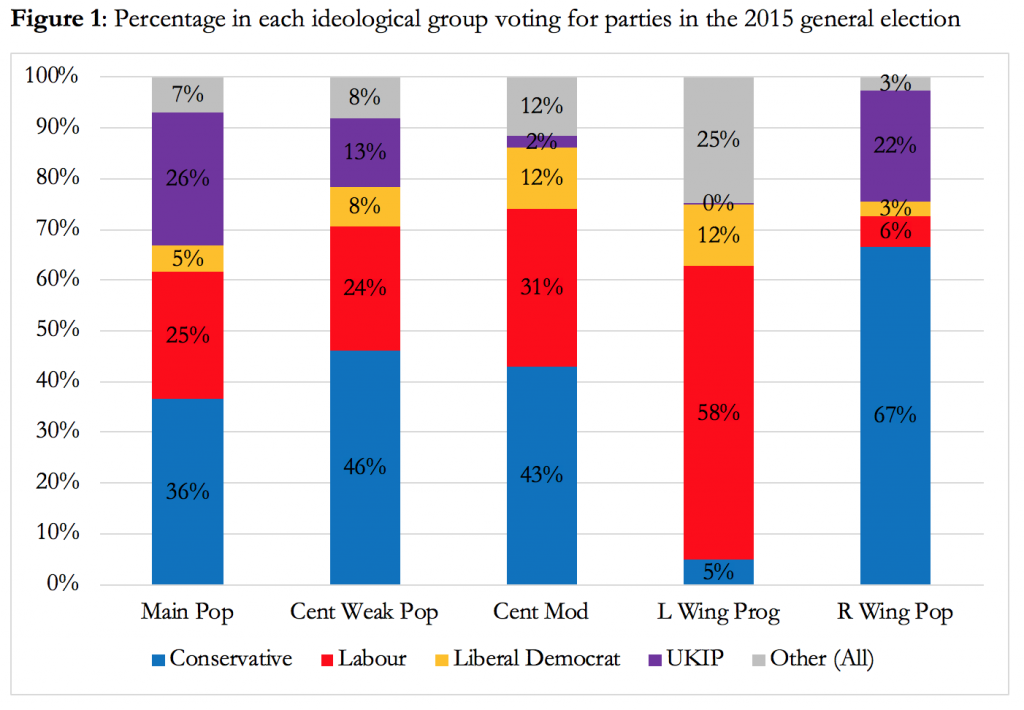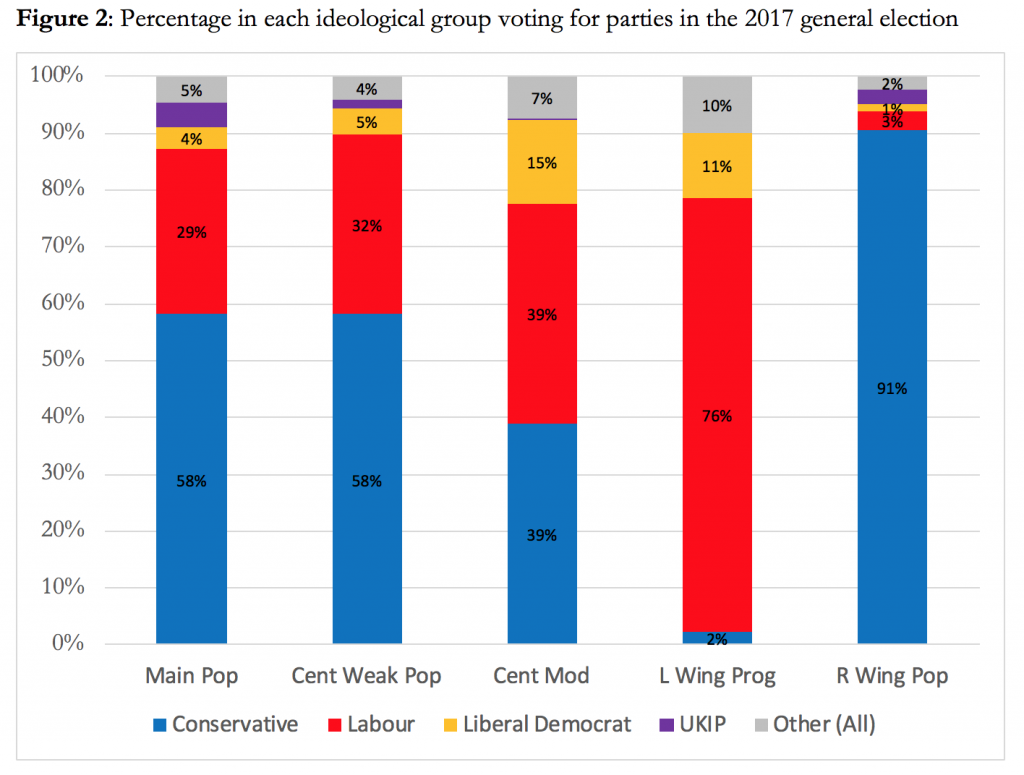
 Despite all the comings and goings at Westminster, and the debatable qualities of the latest Brexit proposal, the underlying ideological dispositions of a large proportion of the electorate favour Boris Johnson and the Conservatives, write Joe Greenwood and Joe Twyman.
Despite all the comings and goings at Westminster, and the debatable qualities of the latest Brexit proposal, the underlying ideological dispositions of a large proportion of the electorate favour Boris Johnson and the Conservatives, write Joe Greenwood and Joe Twyman.
In the aftermath of the success of the Leave campaign in the 2016 referendum on the UK’s membership of the EU, and the ascendency of Donald Trump to the US presidency, there was an enormous amount of debate, discussion, and contemplation of what drove those outcomes. Was it economics? Or culture? Or, more likely, some combination of the two? There is now widespread agreement that a component of the explanation is the renewed prominence of a familiar but sometimes overlooked ideology: populism. In general, populism has been defined as a reduction of the world into an opposition between elites and masses, but this applies to varieties on both the left and right. Given political events, we were interested in the particular variety of that ideology that seemed to have played a part in driving them: authoritarian populism. In particular, we were interested in what beliefs constitute that ideology, and who the people who hold them are.
Using previous research on the beliefs of authoritarian populists as our starting point, we measured eight different beliefs: support for patriotism, support for a ‘strong and tough’ foreign policy, disapproval of the EU, distrust in EU institutions, scepticism regarding the need to protect human rights, a negative view of immigration, opposition to immigration from outside the EU and self-reported left-right political placement. To find out how widespread these beliefs are amongst the British public, we asked a representative sample of 14,923 adults from YouGov’s panel of respondents for their views. Our survey was fielded at various points from 30 May 2017 to 2 March 2018, and thus encompassed a range of political events including the 2017 general election. The resulting sample gave us an excellent opportunity to paint a picture of the ideological landscape in Brexit Britain.
Our first finding was that we live in a country of authoritarian populists. More than half of the public fall into an ideological group with notable authoritarian populist views. Overall, using a process in which we test which beliefs cluster together, we found five ideological groups in the population: mainstream populists (17%), centrist weak populists (20%), moderates (31%), left-wing progressives (18%), and right-wing populists (14%). Both of the first two groups are centrist in terms of left and right and display similarly strong levels of authoritarian populist beliefs. They differ only in the sense that centrist weak populists are less supportive of strong and tough foreign policy, and much less negative about immigration. Moderates are true to their name; centrist in left-right position, with minimal support for authoritarian populist beliefs except that, like the vast majority of the population, they are supportive of patriotism. Indeed, the only group that is notably less supportive of patriotism is the left-wing progressives (though they are not roundly opposed), and this group constitutes the most clear opponent of the authoritarian populist ideology overall.
Standing in stark opposition is the right-wing populists who, as the name suggests are firmly on the right of the left-right spectrum and strongly supportive of all the authoritarian beliefs that we asked about. Overall, then, the picture is one of widespread sympathy for many of the elements of authoritarian populist ideology, with only two of five ideological groups displaying marked opposition: moderates and left-wing populists (albeit, they constitute almost half of the population between them).
But what do these groups look like in terms of demographics? Well, right-wing populists are the only group that is a majority male (58%), whilst also having the oldest average age (56) in contrast to the much younger moderates (average: 44) and left-wing progressives (42). In terms of social grade, the only group that draws a majority from the lower categories (C2, D, and E) is mainstream populists, whilst moderates and left-wing progressives are marked by being majority higher social grade (A, B, and C1): 61% and 68% respectively.
This divide is also reflected in the educational qualifications of the groups: the two groups with the highest proportion of university educated people are moderates (42%) and left-wing progressives (58%). This all fits with the common observation that the adherents of the ideology that supported Brexit tend towards being older, male, from lower social grades, and with lower levels of education. However, it must be stressed that these are only tendencies: there are significant minorities of women, younger, higher social grade, and university educated people amongst right-wing populists, mainstream populists, and centrist weak populists. Indeed, this is why it is important to measure ideology in its own right: we cannot rely on demographics alone to understand why people behave the way they do in relation to politics.
One of the most important political behaviours is voting, and there was an important and dramatic realignment in party support amongst the ideological groups between the 2015 and 2017 general elections. Figures 1 and 2 show the proportions of each ideological group who cast their votes for each party in 2015 and 2017. In line with the tendency for the two largest parties to cannibalise the votes of smaller parties in 2017 (combined, they gained 82.4% of the votes cast) we observed a shift towards Labour and especially the Conservatives amongst mainstream populists and centrist weak populists. More dramatically, the already healthy 2015 levels of support for Labour (58%) amongst left-wing progressives grew to three quarters (76%) in 2017, whilst the two-thirds (67%) of right-wing populists who support the Conservatives in 2015 grew to nine in ten (91%) in 2017. We know the reason for these realignments: 2017 constituted ‘the Brexit general election,’ with voters largely moving to the party that advocated their preferred, or at least a tolerable, position on the UK’s exit from the EU.
But, dominant though it is, Brexit is only one manifestation of the underlying ideological cleavage with which we are concerned. It is important because it provides a ready shortcut for the population to understand the positions of politicians, and it has been exploited by politicians to activate and sustain this ideological divide. A key actor in that process of activation and sustenance has been Boris Johnson. In the days and weeks since ascending to the position of prime minister he has dedicated much time to deploying rhetoric and questionable constitutional manoeuvres designed to remind the swathe of the population with at least some authoritarian populist leanings that he is on their side. He no longer needs to worry about UKIP and has, to a significant extent, disarmed the threat from the Brexit Party, a trend that is likely to be magnified when voters decide where to place their cross on the ballot paper.
Given the UK’s electoral system, the newly salient divide between the Liberal Democrats and Labour over Brexit, and the apparent failure of Jeremy Corbyn’s attempts to re-activate left-right considerations amongst a large enough section of the electorate, Mr Johnson can afford to be cautiously optimistic the coming general election. If those conditions remain and he keeps banging the Brexit drum, there is a majority of the electorate with staunch or partial authoritarian populist beliefs who are likely to support him. Indeed, in addition to their genuine and heartfelt ideological positions and policy concerns, this might be part of the reason that many MPs have so far been disinclined to support holding another general election.
_________________
Note: the above draws on the authors’ chapter in a new edited volume in honour of Professor Anthony King, available here.
 Joe Greenwood is a LSE Fellow in the LSE Department of Government, where he teaches on GV101 (Introduction to Political Science). He previously worked at YouGov and, before that, completed his PhD at the University of Essex. His research focuses on political participation, privilege, and perceptions in the British context. He tweets @niceonecombo.
Joe Greenwood is a LSE Fellow in the LSE Department of Government, where he teaches on GV101 (Introduction to Political Science). He previously worked at YouGov and, before that, completed his PhD at the University of Essex. His research focuses on political participation, privilege, and perceptions in the British context. He tweets @niceonecombo.
 Joe Twyman is co-founder and director of Deltapoll and a presenter of the Polling Politics Podcast. He was previously Head of Political and Social Research at YouGov, having been a director at the founding of the company back in 2000. He tweets @joetwyman.
Joe Twyman is co-founder and director of Deltapoll and a presenter of the Polling Politics Podcast. He was previously Head of Political and Social Research at YouGov, having been a director at the founding of the company back in 2000. He tweets @joetwyman.
All articles posted on this blog give the views of the author(s), and not the position of LSE British Politics and Policy, nor of the London School of Economics and Political Science.










Leaving rather just being absent requires a route. Mooted routes from present membership of the EU are all minority positions that may correlate with other things but they are incompatible with one another. Too little has been made of this incompatibility. Remaining does not need a route, and it has always commanded a larger plurality than elects MPs, for example. In route terms, remain won the referendum.
Nice article – methodology question – which algorithm did you use for this?
> Overall, using a process in which we test which beliefs cluster together